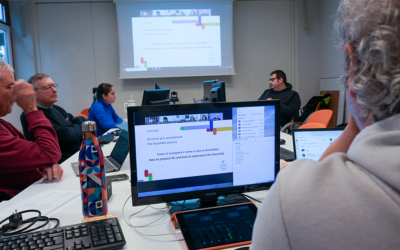 Belfast, with its vivid memories of years of division: barbed wire, walls, its main thoroughfares the stage for the troubles of the 1970’s/90’s. Now against this historic backdrop, in which the political struggle was mixed in with religious struggle, the event of this 14 June has an even greater impact.
Belfast, with its vivid memories of years of division: barbed wire, walls, its main thoroughfares the stage for the troubles of the 1970’s/90’s. Now against this historic backdrop, in which the political struggle was mixed in with religious struggle, the event of this 14 June has an even greater impact.
Three hundred people gathered in St Anne’s Cathedral, which is the heart of the Church of Ireland (the official denomination of the local Anglican Church), in response to the invitation extended by Reverend John Mann, Deacon of the Cathedral. It was he who had invited Maria Voce to Belfast, in order to extend the confines of the Eucharistic Congress. Also present were leaders from the four Christian denominations majorly present in Northern Ireland: Methodist President Reverend Lindsay; Anglican Bishop of Connor (the diocese of Belfast), Reverend Abernethy; Presbyterian Moderator Reverend Dr Dunlop – who worked for peace in Northern Ireland; Catholic Bishop of Down & Connor, Bishop Noel Treanor. Seeing them together spoke volumes. They made an important pact in which they signed, agreeing to love one another as Jesus has loved us. They prayed for the grace of unity, of being able to consider the sufferings of the other as their own and of sharing their joys.
This “Pact of mutual love” was then repeated by all those present. It spoke of a “sacrament of encounter”. Ruth Patterson, minister from the Presbyterian Church in Ireland described the moment in the following way: “It seemed as if what they were saying was already happening. It’s a step ahead towards reconciliation.”
 In her talk, Maria Voce proposed living a culture of trust, as a basis for the construction of brotherly/sisterly relationships: “I’ve listened to many stories during these days, known many people. Many have come to me with tears in their eyes, telling me of their desire to begin again by approaching others with this sense of trust towards them.” Maria Voce highlighted three elements from the spirituality of unity, for bringing about this culture of trust: the art of loving that is found in the Gospel; mutual love that blossoms in a pact; and Jesus Crucified and Forsaken, the Model and Key to love. Her remarks were interspersed with testimonies from Ireland and abroad.
In her talk, Maria Voce proposed living a culture of trust, as a basis for the construction of brotherly/sisterly relationships: “I’ve listened to many stories during these days, known many people. Many have come to me with tears in their eyes, telling me of their desire to begin again by approaching others with this sense of trust towards them.” Maria Voce highlighted three elements from the spirituality of unity, for bringing about this culture of trust: the art of loving that is found in the Gospel; mutual love that blossoms in a pact; and Jesus Crucified and Forsaken, the Model and Key to love. Her remarks were interspersed with testimonies from Ireland and abroad.
And how was her challenge to convert to a culture of trust accepted by hear listeners? “This is the way to move beyond the barriers that we’ve imposed upon ourselves and which too often surround us,” stated Rev Mann.
Fourteen year-old Conleth remarked: “We teenagers are not so conditioned by the past, and so we can be among the first to live the culture of trust towards everyone, and build a better society. Like a phoenix being born again from its ashes, I see a real hope in this for Belfast and for Northern Ireland.”
I leave here with much gratitude towards those who have been living in this hope for years, those who have built bridges of charity, of relating,” commented Focolare co-president Giancarlo Faletti. “The work is certainly not accomplished yet, but it’s a prophetic sign; this is a symbolic place for Europe, for humankind.”
One such person who has lived this culture of trust is Gerry Burns. With his wife, Mary. In a small countryside in the far north of Ireland, they formed an association in 1990 to unite people, beyond politics and religion. They did not give up in face of the difficulties, not even in 2000 when their centre was burned to the ground, nor when they were seen as traitors by their own community. Now their centre is even larger, and people are living in peace with one another. They have many projects in progress. “From the Focolare,” recounts Gerry, “we’ve learned that not only can we overcome our differences, but that we can also benefit from our diversity.”
Compiled by Maria Chiara De Lorenzo




0 Comments